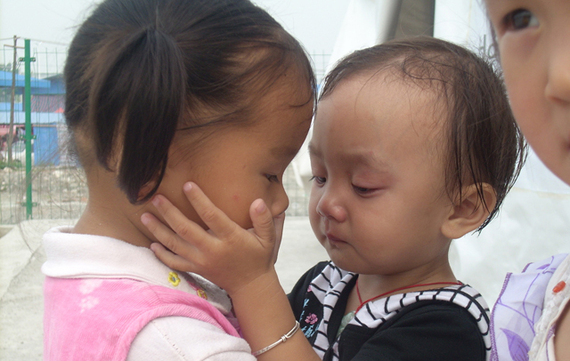2008! If you've already read my book, Wish You Happy Forever, you'll know that 2008 was a one-of-a-kind year for Half the Sky in many, many ways.
In addition to the freak snowstorms across southern China, and the massive earthquake in Sichuan Province, and my Olympic torch-bearing adventure in Chongqing, and Half the Sky's long-awaited legal registration in China, and the fantastic opening ceremony of the Olympics in Beijing (whew!) somehow I was also lucky enough to win the Skoll Award -- something given to a few "social entrepreneurs" like myself who are not merely trying to do good in the world, but to change systems -- the way we do things -- trying to make the world work better.
All this is a long way of telling you that I've just returned from my sixth annual visit to the Skoll World Forum in Oxford, UK. The Forum (and the Skoll Foundation) is focused on "accelerating entrepreneurial approaches and innovative solutions to the world's most pressing social issues." As always, it was an extraordinary, inspirational experience. Like most of the 1,000 delegates, I'm sure, I came away energized, full of bright ideas and new resolve. But this time around, it also got me thinking. Maybe we're missing something here.
The problems addressed by social entrepreneurs like those at the Forum are urgent and grave. Some of the solutions proposed are brilliant. Some of the progress made is astounding. Still, in the course of the week, I found myself haunted by a single thought: Humans made all these problems. We did it.
So is there something we're leaving out of all our recipes for success? Perhaps a critical part of any solution? Not to sound like a science fiction writer or a zealot, but maybe we need to figure out how to make better humans.
Over the years, I haven't spent much time reflecting on the greater significance of the work we've been doing in China. I've been focused on moving that mountain, inch by inch. But writing the book, and then getting out on the road and talking to people about it, has changed all that. I am coming to see that maybe our true journey is just beginning. That what we've accomplished in China is just the first step.
There are some things we now understand about human development. Besides the need for food and water and basic shelter, we humans are all the same in one fundamental way: we need to know love and be loved. Deprived of love, we cannot thrive.
We now know that children who must spend their early years without a consistent, loving adult in their lives will fail to reach their full potential in every way -- physically, cognitively and socially.
Sadly, today we find such neglected children not just in orphanages and shelters, but everywhere. They abound in countries torn by conflict, disease and natural disaster, but also in less likely places: in broken foster care systems and in households where parents must work away from home day and night just to afford food and shelter. Disproportionately, these vulnerable children are the ones most impacted by all of the problems that we're working so hard to resolve.
But there is good news. If a child is nurtured and loved from the very beginning of life, she or he will grow up to become a loving, caring human being. It's that simple.
Imagine a world where it is every child's birthright to receive nurturing care throughout childhood. Imagine the potential of an entire generation of lovingly nurtured children. Who would perpetuate the world's most pressing problems? Who would be the killers, the polluters, the traffickers, the power grabbers, the slaveholders?
Ridiculously simplistic? Why don't we find out? Why not invest a small part of the energy and resources we're pouring into addressing urgent problems into what might be our most precious hidden resource ... the world's most vulnerable children? In a conversation I had at the Skoll Forum, one friend put it beautifully: "Yes, let's make a better world for our children, but let's also make better children for our world."
I started Half the Sky because I thought I saw a simple solution to the devastating consequences of children living without love. No one was doing it. I had to try.
So why not bring that simple solution to children around the world? Or, at least, why not try? Want to explore the possibilities with us? Write to me at jenny @ halfthesky.org (remove spaces)
"All the children who are held and loved will know how to love others ... Spread these virtues in the world. Nothing more need be done."
Mencius (c. 300 BC)
In her new memoir, Wish You Happy Forever, Jenny Bowen, founder and CEO of Half the Sky Foundation, relates the humor and heartbreak of her dogged efforts to become the voice of China's forgotten children, wards of what seems to be an intransigent government on the other side of the world. Wending their way between bemused Chinese bureaucrats and internal board battles, Bowen and the kids emerge triumphant. Today, Jenny is the only Westerner working with the Chinese government to train every child welfare worker in that vast nation, and Wish You Happy Forever allows readers to follow her journey.
